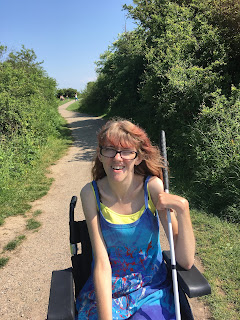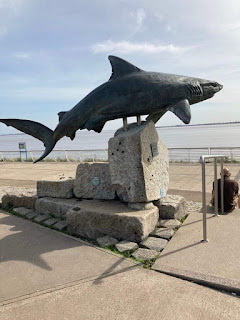My Disability Journey
 |
| Faye in her wheelchair, holding her blind cane. Faye has red/brown hair, is smiling, wearing glasses and a blue dress. Faye is on a country lane with green bushes either side and a bright blue sky. |
It took me until my hearing started to go when I began to accept my disability. By this point, I was visually impaired, had poor mobility, dystonia, aphasia and a life limiting disease, so you'd think I’d be at the acceptance stage of my journey.
When I was new to the wheelchair, so from 12 to 18 years old, I resented it. I rarely had a photo taken in the chair and saw it as a cage, stopping me from enjoying life. Of course, now I know the wheelchair is what enables me to partake in social activities, to travel and have a life. It’s often my own and others attitudes that put up barriers.
It was being included in an art exhibition that helped me be ok with the wheelchair. The joy and freedom of getting creative was just exhilarating!
I used to hate talking to people, not because I had nothing to say, but I was embarrassed and ashamed of the way I spoke. My quiet voice either got people looking quizzically at each other, as if to ask their friend, 'what did she say?', before shrugging in a 'can't be important' kind of way and walking off.
In college, I found the confidence to speak more. Also, I developed a lot of patience, as people asked me to repeat, assuming I didn't mind (I did, as talking used up energy I didn't have, but I wanted to be heard).
The lockdown of the pandemic actually helped my speech. I recorded some Mito fact videos, whilst fundraising. Being forced to stop made me see that slowing down, taking time to do things is a positive, including with my speech.
The hardest disability for me to come to terms with was the sight loss. Sight loss, for me, was just that, a loss. I know that many of those born blind/visually impaired find this term offensive, but, for me, personally, one week, I was loving my driving lessons, with the test scheduled for the following week, and the next, I had to quit because my eyes failed to see the red light (don't worry, the instructor warned me!).
I sank into a deep, dark depression. At the time, I was loving my driving lessons, writing a book, was the family photographer and had good artistic skills. In the moment the ophthalmologist said, 'There's nothing I can do. If you believe in miracles, get hoping.' My hope, trust in doctors (and it was low to start with) evaporated. I didn’t smile for over a month. I tried all sorts to try and accept my new situation. I had different rounds of counselling, but as they were all sighted, how could they understand?
In the second year of being visually impaired I started going to Henshaws. Here, they were so welcoming. The staff and volunteers, both sighted and blind arranged trips out, meals in, and were always on hand to offer advice. Unfortunately, Liverpool City Council decided having three blind centres in the city, was too many. The funding to Henshaws stopped. So did the support and friendships.
Someone from the local RNIB (also closed), nominated me to go on a one week residential holiday with other blind/visually impaired young adults. These four days in Windermere were eye-opening. I met amazing people and saw that things were possible.
The day I got my art equipment out, I felt sad and nervous, as I stroked the black paint on the canvas. I knew my art would never again be the same as I kept splashing, fat tears on the white paper. No one said it looked good, no one even spoke to me that day, except to say, 'you need to speak clearly today.' I tried to join in the conversation, as I drew a toothy, red-lipped grin. I was ignored. Ironically, this first piece represented how I masked the emotional pain and trauma with a smile.
 |
| Black background, three large white teardrop shapes along the top section, more smaller white teardrops which are overlayed with a bright red open mouth. |
As my style changed, I realised I may be visually impaired but it shouldn’t stop me from being creative. There are so many different types of art, disability need not be a barrier. I’ve actually sold more pieces blind than sighted!
Before my sight got too bad, I vented my frustration through writing which I’ve always loved, ever since my short story won a competition in primary school. Expressing myself in words has always helped me. The escapism of stories got me through a lonely time of illness when I was younger. Poetry helped organise things in my mind and sort them out.
I tried counselling again, this time online with the RNIB. Offloading, uncensored, to another blind/visually impaired person helped. I finally accepted my sight loss in 2022, when my hearing went. With little support as my ears deteriorated, I realised nothing will bring smiles, words or colours back so I need to make the most of life.
Losing a skill, any skill, is just that: a loss. Allow yourself time to grieve and, only when you are ready, come back fighting.
Everyone's disability acceptance journey is different. When I asked a friend in a similar position for help and guidance of how to cope, I was told to 'just get used to it.' We’ve since drifted apart.
Others will tell you 'be positive' and 'look at what you CAN do' (difficult when it feels like your body's crumbling).
People always want to either fix or run away from disabled people. Please don't.
Instead:
*Listen. Acknowledge the worries and validate them. It’s ok to be scared in a stressful situation.
*Don’t offer your own ‘I know how this feels' story, as this takes away the speakers moment.
*Don’t give a pep talk calling them ‘brave, inspirational heroes'. This only adds pressure if not being congruent.
Just before my hearing went, I joined Twitter and started following disability activists. I blocked those who were racist (proving that anyone, disabled or not, can hate based on skin tone). Anyway, I digress. Three activists in particular, Dr Amy Kavanagh, Sam Jennings and Stephen Anderson, their tweets spoke out to me. Their messages were of strong, independent adults asserting themselves.
Amy highlights many of the attitudes blind/visually impaired people face, such as sighted people grabbing and taking a blind/visually impaired person somewhere they don't want to be. Amy also highlights/promotes the work of guide dogs and has their own guide dog, Ava. Sam shares her wheelchair access frustrations and joys. She is not afraid to call out bad treatment or terrible access. Stephen is a visually impaired man who’s shared his journey of gaining employment. He is not afraid to tell businesses who refuse him and guide dog, Barney, access, the law. Barney has now retired and he has a new dog called Ava. Most recently, he and other disabled people went to parliament to tell transport companies what disabled access actually means and how they need to improve. You can follow them on Twitter, Dr Amy Kavanagh @BlondeHistorian, Sam Jennings @flowergirl_lon and Stephen Anderson @saj_anderson
These people and others, have helped me to challenge businesses who refuse me access because I am a visually impaired wheelchair user, (now with hearing impairment!).
Perhaps the biggest influence they have had on me, is, I am now ok with saying 'I am disabled.' I saw (well, heard from voiceover) how Amy, Sam and Stephen embrace life, make and take opportunities for themselves, I felt like the word disabled diminished my other abilities and with that label, people would only see what I couldn't do. I even toyed with the phrase 'differently abled', but it felt icky on my tongue. Then I read how Amy, Sam and Stephen owned the word disability as their own. They didn't let fear of others opinions stop them, so why should I?
I am a visually impaired, hearing impaired, wheelchair user with aphasia and dystonia and Mito as the route cause. I definitely qualify as disabled! It was time I owned it!!!
The first time I typed the words, 'I am disabled', I was hesitant, would anyone judge me? But then I thought, it’s their own ignorance if they do. Every so often, there’s a new buzzword for disability. At the moment, its 'diverse abilities'. I heard that the UN are actively encouraging the use of the ridiculous phrase 'diverse abilities' and discouraging the word disabled. My visual impairment, hearing impairment, poor balance and mobility, dystonia, aphasia and other Mito caused disabilities do not add to my abilities, they take away. Businesses who adopt this awful phrase, ought to be aware of the harm they are doing. This unspecific phrase could cause people to not to be honest about what they need, it could cause feelings of shame for those not quite at the acceptance stage of their disability journey.
I really don't know why the able community insist on forcing their own fears of becoming disabled on us who are already there. Perhaps it is to appease their own guilt of how uncomfortable we, the disabled, make the able feel, that they give us these cutesy names. Please stop doing this. I am disabled. My body, peoples ignorant attitudes, transport and businesses refusing me access, this is what disables me! I am not differently able. I do not have diverse abilities. I definitely do not have special needs. This particular phrase annoys me. It’s no wonder I am so often denied entry, if a business thinks they have to go out of their way and do something special, when all they have to do is, obey the law and provide access. There’s nothing special about that. There will be other insensitive names ables have labelled us with under the guise of 'being kind', when actually, they are doing harm.
It’s taken over twenty years, but, I now feel proud to be a disabled woman. I can and am changing access. I can and do stand up for myself.



Comments
Post a Comment